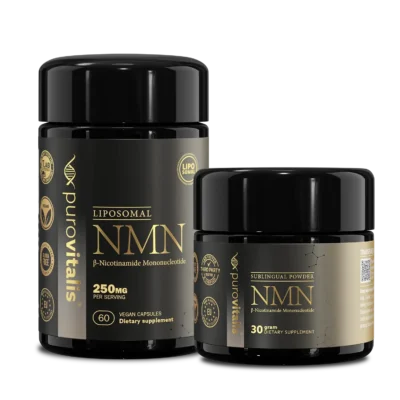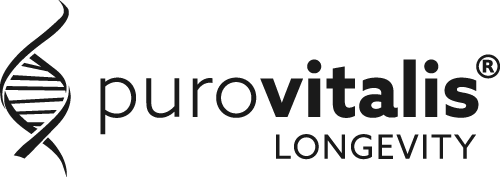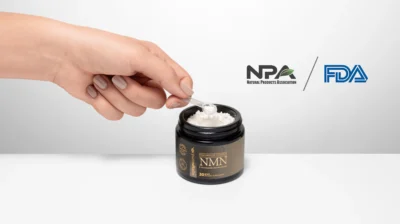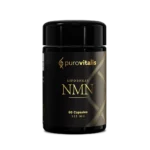
table of contents
You cycle to work and maybe you go for a run in the weekends. You do it for your health, for energy — maybe even to support your longevity. But what if your body could get even more out of the effort you’re already putting in?
A clinical study published in the Journal of the International Society of Sports Nutrition in April 2022 looked into exactly that — and examined whether NMN supplementation can improve endurance and oxygen utilization in regular amateur runners.
What is NMN, and why does it matter?
Short and simple is NMN (nicotinamide mononucleotide) is a molecule the body uses to produce NAD⁺ — a coenzyme that plays a key role in energy production, cellular repair, and mitochondrial function.
As we age, NAD⁺ levels naturally decline, which can affect energy levels, recovery, and overall physical performance — even in otherwise healthy individuals.
A relatable example
Ever wonder why your kids are still bouncing off the walls at bedtime — while you’re just trying to make it to the couch? Their cells may simply be better at producing energy, thanks in part to higher NAD⁺ levels.
The study
This randomized, double-blind, placebo-controlled study was conducted in China and included 48 healthy recreational runners between 27–50 years of age. All participants followed a consistent training program — running and cycling 5–6 times a week for 6 weeks.
They were divided into four groups , where three of the groups received oral NMN powder in different daily doses. The NMN powder was taken twice a day; in the morning and in the early afternoon.
Groups:
- Placebo
- 300 mg NMN per day
- 600 mg NMN per day
- 1200 mg NMN per day
Before and after the 6-week period, participants underwent extensive testing to measure:
- Aerobic performance
- VO₂
- VO₂ max
- VT1 and VT2
- Physical capacity
Definition of VO₂, VT1 and VT2:
VO₂: How much oxygen the body absorbs and uses.
VO₂ max: the maximum amount of oxygen your body can use.
VT1 and VT2: The points during exercise where breathing rate noticeably increases — showing how long the body can perform before getting out of breath.
The results
While VO₂max didn’t change significantly, participants who took NMN — especially at 600 mg and 1200 mg — showed a clear improvement in how efficiently their body used oxygen during exercise.
The highlights:
- VO₂ and aerobic power significantly improved in the 600 mg and 1200 mg groups
- Ventilatory thresholds (VT1 and VT2) increased — allowing participants to train at higher intensity without reaching exhaustion as quickly
- Power at threshold levels was higher in the mid- and high-dose NMN groups
- Balance (single-leg stance test) improved in the 600 mg group
- No effect on strength tests like push-ups or grip strength
Any Side effects?
None were reported — even at the highest dose of 1200 mg/day. All participants tolerated the NMN powder well, and no irregularities were observed on ECG during testing.
What does this mean for active people?
If you already exercise regularly — whether you’re a runner, cyclist, or just enjoy endurance workouts — NMN might offer an additional layer of support.
It’s not about running faster. It’s about lasting longer and recovering better.
The benefit seems linked to how efficiently the muscles use oxygen — not heart performance — which fits well with previous research on NMN’s role in supporting mitochondrial function and energy metabolism.
Read also: Human NMN studies reviewed: benefits for muscle and liver health
NMN and performance — according to the study
| Group | Daily Dose | Result |
|---|---|---|
| Placebo | 0 mg | No improvement in VO₂ |
| Low Dose | 300 mg | Slight improvement |
| Mid Dose | 600 mg | Clear improvement in VO₂ and threshold |
| High Dose | 1200 mg | Strongest improvement across all markers |
For who is NMN worth considering?
This was a small, short-term study. But the results are encouraging.
NMN — especially at 600 mg or more — appeared to help the body use oxygen more efficiently, improving endurance and training capacity in already active individuals.
So, if that scene with your kids bouncing around in the late evening feels all too familiar, NMN might just help you feel like getting up from the couch and joining them.
It’s not only about athletic performance — NMN may also support the kind of energy you need to keep up with everyday life: work, family, and everything in between.
Try NMN today — and see what your cells are capable of.
Related: Benefits of NMN and what is it good for?
References
- Liao B, Zhao Y, Wang D, Zhang X, Hao X, Hu M.
Nicotinamide mononucleotide supplementation enhances aerobic capacity in amateur runners: a randomized, double-blind study. J Int Soc Sports Nutr. 2022 Apr 1;18(1):54.
doi: 10.1186/s12970-021-00442-4

NMN supplements Europe based Liposomal delivery
Our NMN supplements are here for you to help you shine and feel your best! Try it out!













